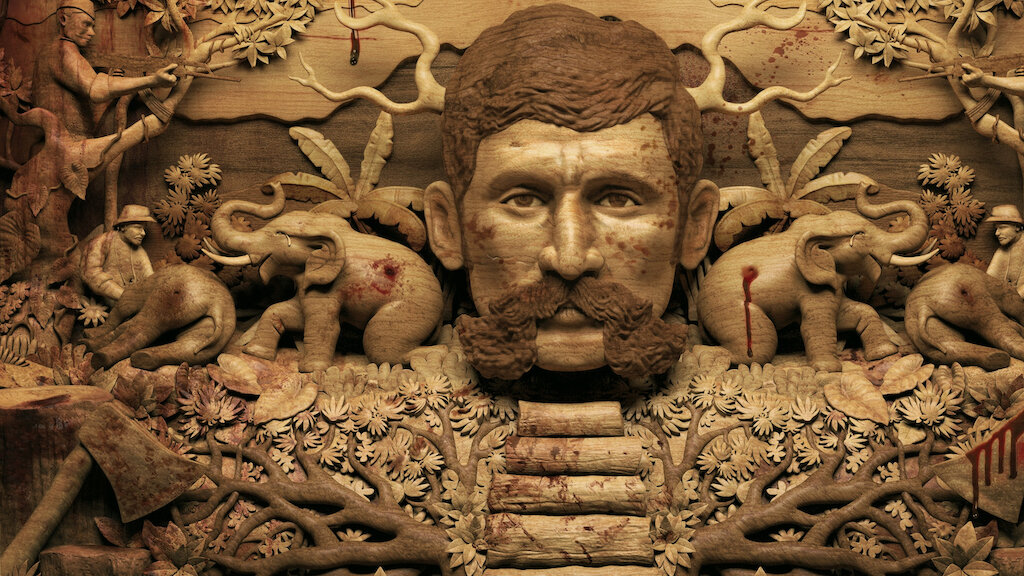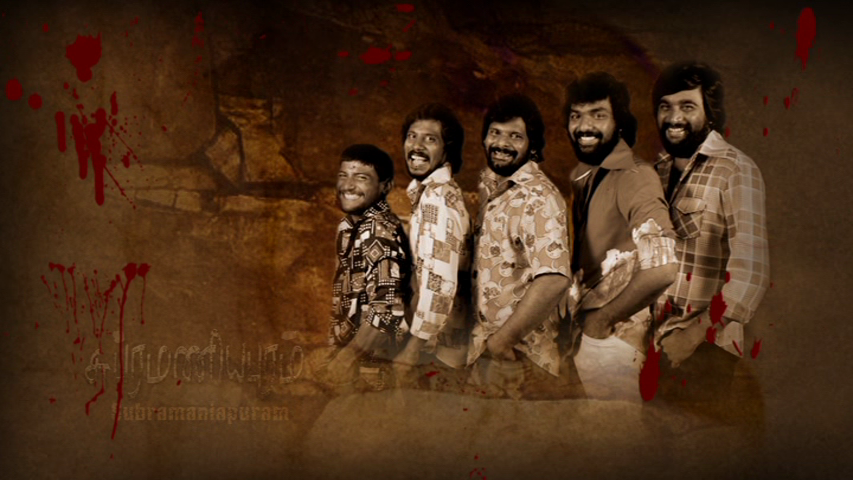THE HUNT FOR VEERAPPAN
THE HUNT FOR VEERAPPAN : REVIEW OF NETFLIX WEB SERIES
4.5 STARS / 5 (MASTERPIECE)
DIRECTOR : SELVAMANI SELVARAJ
WRITERS : FORREST BORRIE, APOORVA BAKSHI
KIMBERLY HASSETT, SELVAMANI SELVARAJ
PRODUCER : NETFLIX, AWEDACIOUS ORIGINALS
“There has never been a set of developments like this in the history of the modern world.”
“There never ever has been a man, a criminal, like Veerappan.”
With these proclamations of formidable foreboding, so opens the explosive documentary on dreaded dacoit Veerappan by director Selvamani Selvaraj, another visionary production by Netflix, featuring a spectacular cast of interviews with top police chiefs, a journalist with an impressive baritone voice anchoring this epic narrative, and a whole slew of insiders who spill the secrets on this rip-roaringly dark Indian chapter.
Director Selvaraj’s thrilling four episode series fuses the best of documentary and cinema in a dazzling feat of true-life story-telling, requiring not one, not two, not three but all four writers – Forrest Borie, Apoorva Bakshi, Kimberley Hassett and the helmer himself. What is seared into consciousness is the blood-‘n’-bombs saga of a legendary forest brigand who butchers elephants, cuts down and smuggles a whole forest’s worth of precious sandalwood and mounts daringly barbaric attacks against the police whose STF (the custom-designed Special Task Force) rips apart people in their equally blood-thirsty pursuit of him.
Veerappan’s capture, however, remains satanically elusive, year after maddening year from the 1980s to 2004, as the cunning forest brigand helps the villagers materially to woo them (they start revering him as ‘Forest King’ and their hero!), this puzzling reversal of public perception not helped by police atrocities against the villagers.
Koose Munisamy Veerappan, whose thin features were distinguished by an exuberant dumbell moustache, dark green fatigues and bullet-bandolier-‘n’-rifle slung across, hailed from the impoverished village of Gopinatham on the Karnataka-Tamil Nadu border. The area adjoins the huge 'M.M Hills' forest, linking to 15,000 square kilometres of dense jungle. Journalist Sunaad Raghuram incisively observes in the first episode that one of the few ways to escape the poverty of the area was to "take advantage of humongous forest wealth that lay all around". Veerappan's rampage of elephant poaching, sandalwood smuggling, kidnap of people, and prolific murders, stretching from the late 1960s to 2004, finally made the States of Karnataka and Tamil Nadu create a Special Task Force comprising hundreds of police officers to nab this domestic terrorist whose gang had swollen to hundred and fifty seven members. Veerappan took advantage of escaping across state borders, whereas the policemen of each state could not easily cross over due to protocol reasons, although the two states’ Joint Task Force created later, might have mitigated this snafu.
The saga’s statistics speak for themselves – Veerappan and gang killed 120 people including 44 police and forest officers, over 1000 elephants were reportedly killed, Sandalwood and pillaged forest resources amounted to INR 100 crores / USD 22 million, 5000 police officers were deployed with INR 220 crores / USD 50 million spent on India’s largest ever manhunt.
One major omission and drawback of this otherwise flawless epic is its refusal to put some spotlight on the significant allegation of how purchased political protection interfered with the nabbing of Veerappan. I was a kid when all this unfolded in real life but one thing I remember hearing recurrently was the political interference that affected his timely capture. This bandit looted crores upon crores of rupees with his poaching and smuggling - you’d have to be very naïve and thick as five posts not to have some doubt that at least some of that stupendous lucre was paid to politicians to protect this criminal. Sure, the series does show his association with Tamil Nationalists like Kolathur Mani and the Liberation of Tamil Tiger’s Eelam (LTTE), but for such a frank series, the omission of the alleged angle of purchased political protection is glaring. One or two tantalizing details, though, peep through - 'Tiger' Ashok Kumar says that had he not been transferred on from the STF, he would have killed Veerappan. There are two ways to view this - one, he was boasting ; two, he was deliberately transferred out before he got too close to his great quarry.
You'll be hard pressed to find another documentary where every single interviewee is impressive in their riveting soundbites and unique personality - whether it's the assortment of villagers whose names are shown in marquee XL font, the phalanx of police officers each different and yet each offering their own slice of cutting insight into this forest nightmare, and Veerapan's wife Muthulakshmi and gang member Anburaj who humanize the monster.
You have the Milieu and the Music. The milieu, adroitly lensed by Udit Khurana, is the magnificently dense jungle straddling the state borders of Karnataka and Tamil Nadu, often covered by painstakingly getting up before dawn for stunning mist-shrouded shots – a forest so thick that you could lose your companion in a minute, the elephant, tiger, leopard all waiting to meet you, and even if you miss them there is the King Cobra waiting to say Hi!, and behind ‘em all lurks this ruthless rifle-swinging mustachioed bandit with his burgeoning gang. The environment often centers on the infinite primal forest and the humble human settlements rimming it, but the powerful international production ensures that every detail is captured with expert aesthetics.
The Music by Jhanu Chanthra, crackles, snarls and laments, in a razor-sharp value addition that only loses its edge in the concluding part four, as though his heart was not in the choice of narration there.
One great yet subtle strength of this documentary, by fascinating omission, is the absence of reconstructed videographed events – the series is expertly content to recreate specific events just by verbal narration, sound effects and well-chosen photos. The overall format is interviews with experts and key figures in Veerappan’s life, interwoven with photographs and news captures from the past, admixed with current day montages of the jungle.
CHAPTER ONE, opens with Verappan’s wife Muthulakshmi – a pre-eminent, complex, haunted figure throughout this series. Then come other riveting interviewees – the rich oaky baritone voice of investigative journalist Sunaad Raghuram whose sophisticated, measured English and narrative command is on par with the best of any Western commentator… Principal chief conservator of forests - B.K Singh, now aged but still sharp in remark, who smiles and speaks with wonderful quiddity and refreshing honesty – one of the true delights of the whole series, and Special Task Force big-shot ‘Tiger’ Ashok Kumar who elocutes with the special native elan of a classic Karnataka tongue. ‘Tiger’ Ashok Kumar, like Muthulakshmi and Sunaad, is there till the series’ last shot, one of the key guides of the series. The legend and ferocity of the brigand is established, culminating with the poignant fate of an enigmatic figure – senior forest officer P. Srinivas, who with his seemingly humane technique, makes the most inroads in eliciting the deep goodwill of villagers, introducing the idea of surrender, and reaching closer to Veerappan.
CHAPTER TWO, the most thrilling and chilling of the series, aptly titled ‘THE BLOODBATH’ – simply explodes with the back-‘n’-forth hellish battle between this marauding dacoit and the multiplying police task force. This is not for the squeamish – the details are gory, issuing from the spoils of war and bombs, splattered blood and hanging body parts. The great narrator here is another Special Task Force expert – police officer K. Arkesh who speaks with expert insight and scholarly authority – just his first three lines on Veerappan are so penetratingly good that they are used as the introductory lines for the series trailer. Devastatingly effective and brave police officers keep coming in to thrown down their gauntlet – Shakeel Ahmad, T. Harikrishna, ‘Rambo’ Gopalkrishnan - their quarry retaliates with stunning intelligence cut into ferocity, the police officers collapse in their seats with shock at this merciless counter-attack until one toweringly forbidding Police figure emerges – Shankar Mahadev Bidari - whose warlord reign of torture and murders destroys the distinction between police and criminal but also extinguishes Veerappan Gang numbers from 157 to just 6.
CHAPTER THREE opens its darkening wings with how brutally tortured and sexually humiliated Muthulakshmi was by the police. Her husband hibernates for two years, smartly vigilant K. Arkesh raises the alarm of something big brewing – which is complacently ignored by the top brass, and then Veerappan kidnaps Dr.Rajkumar, Karnataka cinema’s highly adored icon. Abducting Karnataka’s most loved veteran would be the signing of another death warrant for oneself, but V-man has more gravy to boil in his insane cauldron, as he affiliates with Tamil nationalists and the LTTE (Liberation of Tamil Tigers Elam). The brigand might have some noble Tamil nationalist demands amongst others but wait till you find out how much money he asked in ransom.
CHAPTER FOUR : By this juncture, the explosive battles are finito, and the trickery and luring have begun. Despite all the torture and humiliation he heaped on Karnataka, the capture of Veerappan himself could not be done by Karnataka STF even as they drastically reduced his gang size – the actual end-game fell upon the wily Tamilians. Two top cops from the Tamil Nadu STF – K. Vijay Kumar and N. K Senthamarai Kannan - team up to sing the coda to the diminished king canary. ‘Between two people, it’s a secret but with a third, it’s news’ – so they keep the master-plan just between themselves. A shibboleth is repeated – ‘He is invincible as long as he is in the forest, therefore he has to be lured out’. However, the bang in the tail is missing in this finisher – more on that later.
More than one man alleges that Muthulakshmi betrayed her husband. Whether she did this or not, no one discusses whether her husband incinerated HER life. Muthulaskhmi says she was 15 and he was 39 when he uttered Romeo bleeding-heart lines in courting her – did the much older and wiser person not realize what a hell he would be consigning his wife to, by her entering into union with such a hunted man? He would get his joys in the forest while she would eventually have to deliver a child by returning to the village and then be vulnerable to torture by the police which is exactly what happened to her. He betrayed and destroyed her life from the get-go – the truth hiding in plain sight in this documentary which no one points out.
The writers and director do a terrific job of delineating the psyche of the remorseless brigand who wreaks carnage in this sylvan demi-monde. Later in the series, Veerappan wants to spend a peaceful life with his wife and daughters but if you really want to do that, you do not brutally murder countless police officers and then still fantasize that they'll let you spend your post-jail swansong years amidst family in pastoral repose. When he narrates the stories of his attack on police involving their murder and blood-spewing in his thin innocuous voice, it is with almost a hand-rubbing glee like a kid describing his first-person shooter video game exploits. He makes his Tamil nationalist demands upon a major abduction, but underlying that is a demand for massive money, conveniently hidden from the public, that supersedes such superficial things like ideology. His only true attribute is his knack for attack, anointed as it is with an ocean of blood. Top police officers can't help themselves praising how Veerappan plots his attacks with demonic cunning - if he's out to get you, he will "lay the ambush in such a way that you are sure to come there, and you are sure to get killed. This kind of perfection he had achieved, otherwise Veerappan would not have survived for so long... "
"If citizens are ready to accept as a hero a criminal wanted by the government, it shows that the government dealt with this situation in a despicable manner." - Statement by Anburaj (Veerappan gang member). When you have a tumour in the leg, there are two ways to remove the tumour – cut out only the lump while leaving the leg intact, or cut out the whole leg – the police here seem to have often tilted into the latter. So many reports abound of them brutally torturing the villagers and imposing draconian terrorist laws into imprisoning them – these are the kind of excesses which poison the psyche of the public and which top Tamilian film-makers like Mani Ratnam have built a career around highlighting. The police here, of course, will say that armchair critics do not know the conditions that compelled them to do what they did – ‘Tiger’ Ashok Kumar conveys his ilk’s compulsions with compelling words - but considering all the gruesome realpolitik of this crazy world we live in, the police atrocities here touch a very raw nerve.
Unfortunately, this casts a shadow on the sacrifices the police made and the successes they achieved in a highly challenging milieu. Many of them lost their lives and were grievously wounded. A mere few months away from the wife is enough to shake a marriage – these officers spent seven to fifteen years in the forests and as a senior officer M. Ashok Kumar reports, it took a great toll on their personal lives.
This milieu and this saga's sociological analysis would be incomplete without acknowledging the poverty and underdevelopment of the region in and around Gopinatham village in the Karnataka-Tamil Nadu border, which vitiates this story. It is a few decades into modern India's arc where cities themselves are struggling, forget forest-adjoining hinterlands like Gopinatham where a famished job market and poor infrastructure wreak more carnage than man-eating monsters ever could. A hardcore criminal like Veerappan could come from anywhere, including from a well-off society (cf. 'Vengeance Is Mine'), but he only became this powerful by his gang swelling to more and more members and that kind of proliferation is often fed by a devastated, impoverished society. Everyone watching this series, including politicians and sociologists, would do well to note what can happen to a neglected society - people in general degenerate, and there is a higher risk of a highly malevolent force like Verappan emerging. What happens when a whole bunch of Veerappans emerge ? You get the Taliban.
Veerappan’s dalliance with the Tamil nationalists and the LTTE illustrates how useless and toxic either side was. If the Tamil nationalists had some moral sense, they would not affiliate with a serial murderer, and if Veerappan had an ounce of sense left in his crazed man-killer head, he would not have touched with a bargepole the LTTE (the terrorist organization that assassinated Rajiv Gandhi who had just finished his term as India’s prime minister – another country like USA would have finished off the LTTE in a frenzy of retaliation, while 1990s India showed its impotence by doing nothing). So-called Tamil nationalist Kolathur Mani says he had a ‘soft spot’ for Veerappan when the latter repeatedly called for Mani in the ending years, yet when asked for his reaction on Veerappan’s demise, Mani says he felt nothing but instead felt sorry for the people who suffered collateral damage – classic politician double-speak. The only Tamil nationalist who comes away decent is the veteran Pazha Nedumaran who goes to the jungle and puts some simple sense into Veerappan by telling him - ‘A free Tamil land is the dream of all of us, no dispute there, but you cannot accomplish this with one kidnapping’.
One great player here is no mere human – it is the Jungle itself and the series gives vital insights into this vast teeming mega-organism. ‘Tiger’ Ashok Kumar evokes the challenges of being in the forest when he says - ‘in summer, there is no drop of water anywhere, you had to wait for the morning to lick the dew off the grass.. in the winter, there was tremendous cold.. “ Superstar Rajkumar when asked about his kidnapped experience in the jungle, says he was profoundly moved by the song-like rise and fall of the croaking of hundreds of frogs in a river at night – a surprising perspective but then you realize no wonder he was a top artiste, and no wonder people saw something special in a man like this. When Veerappan gets good news regarding his ransom demands, he places a plate with water and sugar in front of his captives, and squeezes juice out of special leaves into the sugar water and after some time, a cake-like concoction forms on the plate! – a testament to the jungle’s natural chemistry wonders.
All these metric tonnes of great sandalwood-grade material are taken by director Selvaraj and sculpted into a great shifting framework. The material is all there – but he has to maintain the tone-'n'-momentum throughout, guiding his interviewees into suitable delivery, cutting to past visuals, and weaving everything together into compelling narration, which he performs splendidly, aided and abetted by a quartet of smooth editors and superb background music by Jhanu Chanthra. In the very first episode, Chanthra jacks up the proceedings with a wide variety of mood-deepening undertones and maintains that knife edge for much of the series. The fourth and last episode has good material throughout, but the verve and glint of the first three episodes is missing – the one objective factor missing in that finisher is the background music which is suddenly palsied and limping as if someone broke the kneecaps of the composer. This illustrates how the director can sometimes feel left out, dispirited and abandoned when the heretofore brilliant composer goes for a coffee break and does not return.
This is an emerging golden age for Indian web series, films and documentaries, often powered by Netflix – a leader among similar streaming platforms. Liberated by bold fearless producers and strong writers, Indian directors from these platforms are making thrilling new leaps into timeless territory.
UPN
UPNWORLD welcomes your comments.










0 COMMENTS
WRITE COMMENT